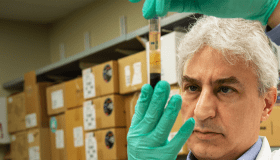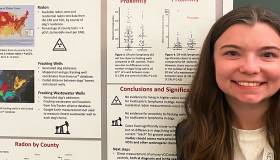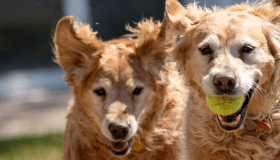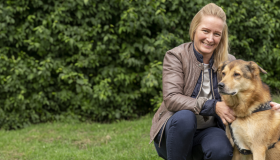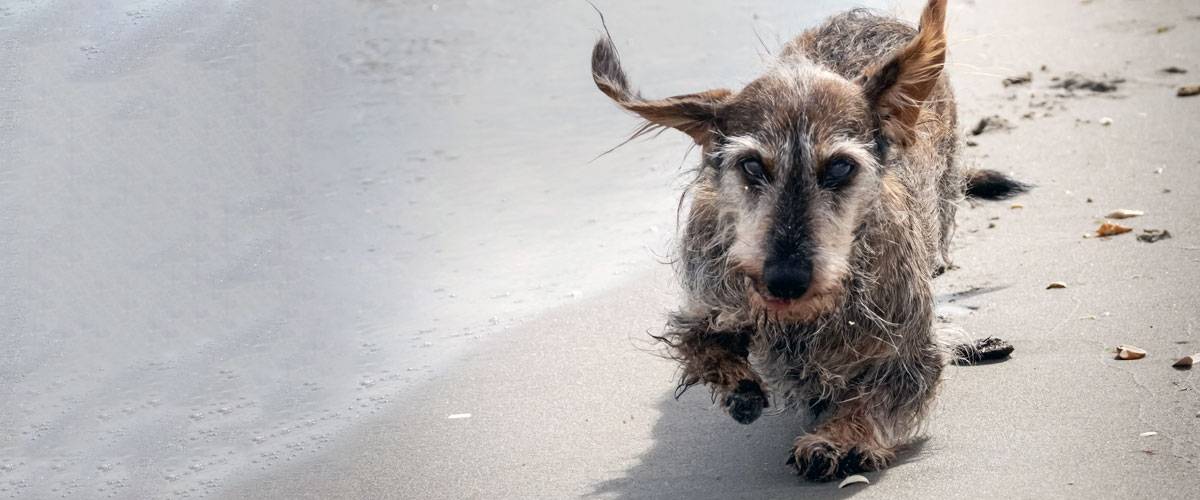
Updated June 29, 2023 – Cancer is a disease that impacts animals everywhere, from the pets in our homes to marsupials half a world away. With approximately 12 million diagnoses every year in dogs and cats in the United States alone, cancer remains a leading cause of death in our companion animals.
In 1962, the Foundation funded its first animal cancer study, “Phase One: A Study of Enzymes in Canine Neoplasia.” The investigation, at The Ohio State University, was one of the first to try to gain a basic understanding about the formation of tumors in dogs. Subsequent studies continued to narrow in on specific types and aspects of cancer among dogs and cats.
“For many, many years, the focus on cancer funding was for feline and canine research, at the urging of donors who realized cancer was probably the leading cause of death for their pets,” said Dr. Rod Page, first Principal Investigator of the Foundation’s Golden Retriever Lifetime Study and Director, Flint Animal Cancer Center at Colorado State University.
That focus was rewarded with significant progress. For example, the Foundation supported key research to develop the first vaccine for feline leukemia virus, an important cause of cancer in cats. Since the vaccine was created in 1986, the number of associated cancers has dropped significantly.
These types of successes are important – they show we can make progress in pet cancer research and save lives. They encourage us to continue to fight against cancers that still need to be conquered, such as oral squamous cell carcinoma, which accounts for 75% of all feline oral cancers. This devastating and painful cancer in cats remains a major funding focus area for the Foundation which continues to fund innovative research aimed at finding new diagnostics and treatments to improve lives and well-being of affected cats.
The Foundation’s cancer fight doesn’t stop with dogs and cats, though. In horses, we've funded studies looking at squamous cell carcinoma, the most common eye-related cancer in horses, and equine melanoma. In wildlife, we support studies researching cancers threatening species’ existence, including contagious cancers in Tasmanian devils and an ear-associated cancer in foxes causing drastic population declines.
Looking ahead, Dr. Page believes new cancer research will examine the genetic basis for cancers to improve diagnosis and treatment. Dr. Page also felt that a lot of cancer science will focus on the development of immunotherapies – harnessing attributes of the body’s own immune system to fight cancer. In dogs, he said, hemangiosarcoma, a deadly cancer in dogs, will continue to draw special attention.
“The wish list for every veterinary oncologist starts with trying to find some way to deal with hemangiosarcoma. It’s a tumor that’s relatively unique to dogs and has completely evaded all attempts to understand what’s going on in a way that’s able to be modified in the patient,” said Dr. Page. “It’s a rapidly fatal cancer and one that desperately needs better diagnostic tools and treatments.”
Morris Animal Foundation is working hard to answer this wish, for both veterinarians and owners impacted by this canine cancer. The Foundation recently launched their multi-year, multi-million dollar Hemangiosarcoma Initiative to fund multiple studies to find answers for earlier diagnosis, new therapeutic approaches and genomic risk factors. It’s our hope that a concerted research focus will help veterinarians to better care for these canine cancer patients, improving their quality of life and giving them more time to enjoy life with their owners.
How You Can Help
Just as the level of understanding of cancer has increased, so too has the cost for the average cancer grant. It’s about 25 times more expensive now than in 1962 to fund the average cancer study, increasing from $8,000 to around $200,000 per cancer study. That is why donor support is so crucial. From prevention to treatment, each gift we receive to support cancer research means more years for the animals we hold dear.
DONATE TODAY and help advance cancer care for the animals we love.
Resources:
- Cancer and Cancer Treatments in Pets
- Study Aims to Uncover Link Between Environmental Toxins and Lymphoma in Dogs
- Understanding Histiocytic Sarcoma in Dogs
- Taking On a Deadly Cancer in Cats – Feline Oral Squamous Cell Carcinoma
- Understanding Feline Lymphoma – New Thoughts on a Common Disease
- No Horsing Around with Cancer
- A Win in the Battle Against Cancer in Horses
Listen to Our Researchers:
- WEBINAR: Hemangiosarcoma: What Every Dog Owner Needs to Know and Research Insights
- PODCAST: Episode 56: Lymphoma in Cats and Dogs
- PODCAST: Episode 54: Environmental Toxins, Cancer and Pets
- PODCAST: Episode 52: New Ideas on Hemangiosarcoma in Dogs
- PODCAST: Episode 50: Repurposed and Translational Drugs

